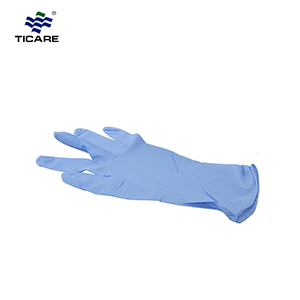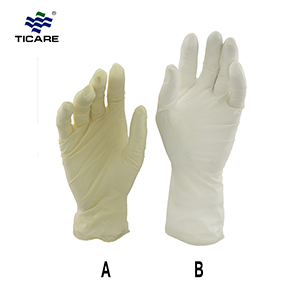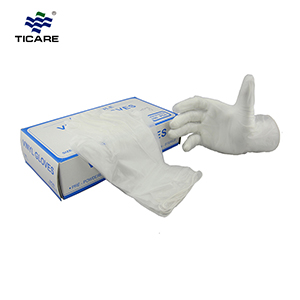When it comes to choosing the right gloves for your needs, the options can be overwhelming. Nitrile, latex, and vinyl gloves each have their own unique characteristics and benefits, making them suitable for different applications. This comprehensive guide will help you understand the differences between these types of gloves and determine which one is the best fit for you.

Nitrile Gloves
Material: Nitrile gloves are made from synthetic rubber, which makes them a great alternative for individuals who have latex allergies.
Advantages:
-
Allergy-Free: Since they are latex-free, they are ideal for people with latex allergies.
-
Durability: Nitrile gloves are highly resistant to punctures and tears, making them suitable for tough tasks.
-
Chemical Resistance: These gloves offer excellent protection against a wide range of chemicals, including oils, greases, and certain solvents.
-
Fit and Comfort: Modern nitrile gloves offer a fit and comfort level similar to latex, molding well to the hand.
Disadvantages:
-
Cost: Nitrile gloves tend to be more expensive than latex and vinyl gloves.
-
Environmental Impact: Being made from synthetic materials, they are not as environmentally friendly as natural latex gloves.

Latex Gloves
Material: Latex gloves are made from natural rubber, which provides excellent elasticity and comfort.
Advantages:
-
Comfort and Fit: Latex gloves provide a superior fit and feel, which can enhance dexterity and reduce hand fatigue.
-
Tactile Sensitivity: These gloves offer excellent tactile sensitivity, making them ideal for tasks requiring precision.
-
Biodegradability: Being made from natural rubber, they are more environmentally friendly compared to nitrile and vinyl gloves.
Disadvantages:
-
Allergic Reactions: The biggest drawback is the potential for latex allergies, which can cause skin irritation or more severe reactions.
-
Chemical Resistance: Latex gloves are not as resistant to chemicals and punctures as nitrile gloves.

Vinyl Gloves
Material: Vinyl gloves are made from polyvinyl chloride (PVC), a synthetic material.
Advantages:
-
Cost-Effective: Vinyl gloves are generally the most affordable option, making them suitable for low-risk tasks and environments.
-
Latex-Free: They are a good alternative for individuals with latex allergies.
-
Availability: Vinyl gloves are widely available and come in various thicknesses and sizes.
Disadvantages:
-
Durability: Vinyl gloves are less durable and more prone to punctures and tears compared to nitrile and latex gloves.
-
Fit and Comfort: They provide a looser fit and less tactile sensitivity, which can be a disadvantage for tasks requiring precision.
-
Environmental Impact: Like nitrile gloves, vinyl gloves are made from synthetic materials and are not biodegradable.
Which One is Better?
The answer to which type of glove is better depends on your specific needs and the context in which the gloves will be used. Here’s a breakdown based on different scenarios:
-
Medical and Healthcare Settings:
-
Best Choice: Nitrile gloves
-
Reason: Nitrile gloves offer excellent protection against chemicals and pathogens, and they do not cause latex allergies. Their durability and puncture resistance make them ideal for medical applications.
-
Food Handling:
-
Best Choice: Vinyl gloves
-
Reason: Vinyl gloves are cost-effective and suitable for tasks that do not involve high risk of exposure to chemicals or pathogens. They are often used in food preparation and handling due to their affordability.
-
High-Risk Chemical Environments:
-
Best Choice: Nitrile gloves
-
Reason: Nitrile gloves provide superior chemical resistance and durability, making them suitable for environments where strong chemicals are handled.
-
Tasks Requiring Precision:
-
Best Choice: Latex gloves
-
Reason: Latex gloves offer the best fit, comfort, and tactile sensitivity, making them ideal for tasks that require a high degree of precision and dexterity.
-
General Purpose:
-
Best Choice: Nitrile or Vinyl gloves
-
Reason: For general use, nitrile gloves are durable and versatile, while vinyl gloves are affordable and sufficient for low-risk tasks.
Conclusion
In summary, the best glove for you depends on your specific needs and circumstances. Nitrile gloves are a top choice for their durability, chemical resistance, and allergy-free nature, making them suitable for medical and high-risk environments. Latex gloves are preferred for their fit, comfort, and tactile sensitivity, ideal for precision tasks. Vinyl gloves are the most cost-effective, suitable for low-risk and general-purpose applications.
When selecting gloves, consider the task at hand, the risk of exposure to chemicals or pathogens, and any potential allergies. By understanding the strengths and limitations of nitrile, latex, and vinyl gloves, you can make an informed decision that ensures safety, comfort, and efficiency in your work.


